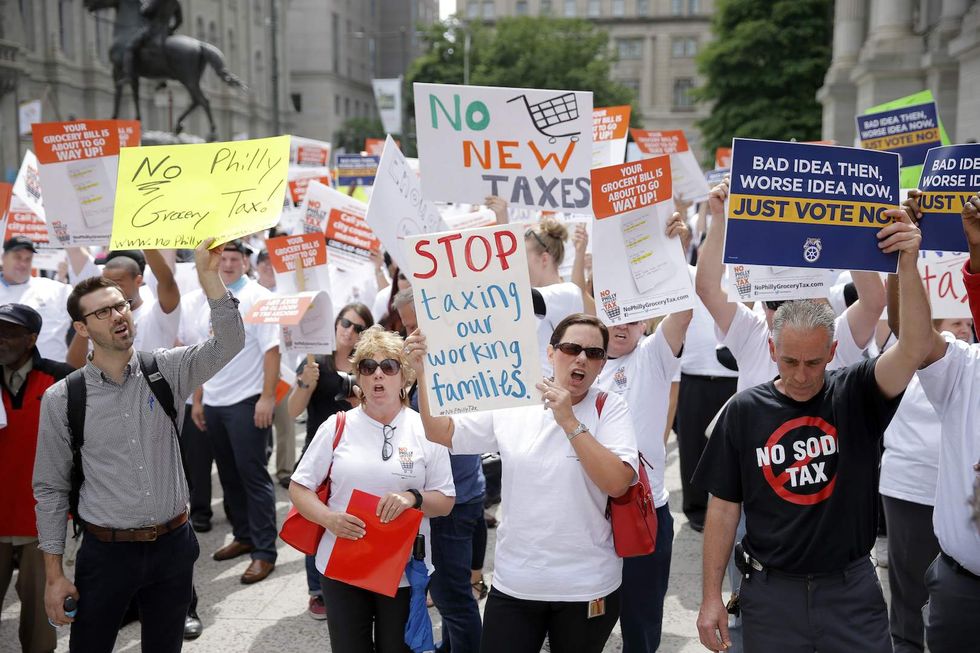
Opponents of a proposed sugary drink tax demonstrate outside City Hall in Philadelphia, Wednesday, June 8, 2016. Philadelphia City Council ultimately passed the tax, which has been a source of public controversy. (AP Photo/Matt Rourke)

There is little debate that America faces an epidemic of obesity and obesity-related diseases. In typical liberal fashion, the Democrat-dominated city of Philadelphia decided two months ago that this was a problem that could be solved by government regulation, and promptly passed an ordinance that imposed a massive tax on “sugary drinks.” Theoretically, this was supposed to not only punish people for having the gall to enjoy a Diet Coke (yes, artificially sweetened drinks are also taxed), but also to pay for a universal pre-K program in the city.
If you're thinking to yourself, "Wait, you can't stop people from drinking sodas and also reap huge tax receipts on the sales of soda at the same time," then you're at least two steps ahead of the City of Philadelphia, and you probably know by now where the rest of this story is going, too.
It is not immediately clear how or why Gatorade, Coca-Cola and Root Beer were singled out, alone among all the other calorie-rich products regularly consumed by Americans. Regardless, the end result of poorly-conceived government regulation is always the same no matter the target: loss of liberty, economic chaos, finger-pointing.
Philadelphia grocery consumers were immediately stunned by sticker shock and began a near-open revolt. In the meantime, the economic consequences of government meddling in the contents of your dinner glass are still reverberating throughout the city, albeit in predictable ways. In the first place, residents have almost completely stopped purchasing sodas in Philadelphia, which means that overall tax receipts have gone way down, in spite of the massive increase in the rate of taxation.
But it gets worse: private individuals and businesses are also being harmed. Via Reason:
One of the city's largest beverage distributors is planning to cut 20 percent of its workforce, Philly.com reports, and grocery stores across the city are also planning to shed jobs to make up for declining sales. It appears that the tax is causing some shoppers to drive beyond the city's borders in order to do their grocery shopping (who could have seen that coming, right?).
"In 30 years of business, there's never been a circumstance in which we've ever had a sales decline of any significant amount," Jeff Brown, chief executive officer of Brown's Super Stores, told Bloomberg. "I would describe the impact as nothing less than devastating."
The Mayor of Philadelphia, meanwhile, refuses to accept that any portion of the blame for these economic effects — effects which disproportionately impact low-income families in Philadelphia — belongs at City Hall’s doorstep. Instead, he blames… the greedy soda industry:
"I didn't think it was possible for the soda industry to be any greedier," Kenney said in an emailed statement to Philly.com reporter Julia Terruso. "They are so committed to stopping this tax from spreading to other cities, that they are not only passing the tax they should be paying onto their customer, they are actually willing to threaten working men and women's jobs rather than marginally reduce their seven figure bonuses."
It's not the first time Kenney has tried to ignore basic economics when it comes to the soda tax. A few weeks ago, he blamed grocery stores and restaurants for "price gouging" when they increased prices for sugary drinks to make consumers pay for the cost of the tax (the tax is technically applied on the transaction between distributors and retailers, but, like all other taxes, it gets passed along).
Who could have possibly predicted that a company would respond to the imposition of a government tax by passing that tax along to consumers — Other than anyone with a basic understanding of economics, of course?
The City of Philadelphia shows no sign of relenting on their ill-conceived tax, even though it is actually costing the city money to keep it this high. According to the Philadelphia Inquirer, a city spokesman indicated that the job losses were somehow likely not permanent and that the city’s grocery stores were involved with soda manufacturers in some sort of scare mongering campaign:
“We have no way of knowing if their sales figures and predicted job losses are anything more than fear-mongering to prevent this from happening in other cities,” said city spokesman Mike Dunn.
Well, that certainly is one possible explanation. The other explanation is that these are the ordinary economic and government receipt results of punitive taxation on any given commodity. If you raise the taxes on anything high enough, people will indeed stop purchasing it. Just be sure you're prepared for whatever economic effects might flow from that decision.